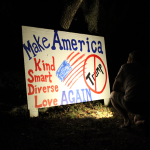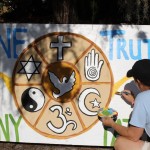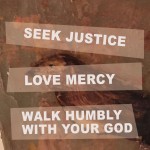Part of my goal here with this little blog is to share other voices living at the intersection of being gay and Christian in America. I mean I love the sound of my own voice as much as the next blogger, but I said in the beginning of this project that it’s not all about me, well, unless it is.
A little over a week ago there was a little event called Emergence Christianity: A National Conversation with Phyllis Tickle and Friends, January 11-12, 2013, in Memphis, Tennessee. I did not plan well and due to my relatively new job (that I adore) I really could not get away to be present to honor Phyllis or to participate in the all conversations that I’ve heard were sometimes quite exciting and sometimes the same old conversations with the same old people we progressive/emergent religious types like to have amongst ourselves.
I was though, thanks to Twitter, able to glean little sparks of conversations from the folks who were there and from people like me who were trying to listen in and sustain ourselves on little Twitter nuggets across the miles. During one Twitter exchange a friend of mine, Jeff, asked a question about how we are planning to wrestle the microphone from the conservative Christian voices who dominate the American media landscape, and thus the imaginations of many Americans (my wording, not precisely his – Jeff, please correct me if I got it wrong). At that point a Tweet popped up from someone I had not yet met, R Jay Pearson. R Jay pushed back a bit with the lovely language of taking the high road, turning the other cheek, we don’t need the mic – all things I bet you can guess got me a little riled, right?
I mean, here I am with my pathetic little microphone trying my dead-level-best to counter the predominate Christian voice seemingly more grounded in imperialism nationalism, homophobia, domination and literalism than the still speaking God of love and justice and some dude who was clearly more spiritually evolved than me was counseling me that we need not participate in the conversation that the literalists are having. OK, maybe the whole “more highly evolved” thing is just my stuff – 140 characters at a time a’int exactly the easiest way to communicate passion, faith and conviction – with grace. Jeff and I both pushed back and reiterated over and over that we need to speak up, in public ways, lest we abdicate the conversation, and maybe all of Christianity to the goats. Neither one of us felt like the exhange ended all that well but I’d put my money on how much we’d have a much more intelligent, intelligible and compassionate conversation if we could sit down in the same room (possibly over a toasty pint) and really get to know one another.
Well, R Jay stopped by and commented on a recent post of mine and his story was so powerful I really thought it would be worth sharing with you here in a post of its own. I share it because it is so important to understand the real pain that is felt by faithful loving people when some Christians put their narrow, literalist interpretations and willfully ignorant understandings about human sexuality and relationships above deep and abiding love. Hey Jay, let’s find you a UCC church in your neck of the woods ok? 😉
Here is his post.
Kimberly, you were right.
During our tweets at #EC13 (the Twitter tag for the recent Emergence Christianity conference in Memphis) when we were discussing how to engage those on the fringes as well as those who currently hold the reins of the broader conversation on gay issues, you wrote, “We need to speak up too, and in ways that can be heard. … It is critical to counter the dominant message in all we say and do.”
I was responding to you (somewhat obnoxiously, I must admit, though my intent was good) with gracious disagreement accessorized with lofty notions of turn the other cheek, take the blows, let them harm us, and so on. And in it all, while I was expressing laudable Biblical examples of passive resistance, I was making the wrong point (and even missing the point altogether).
Jesus did more than just engage in passive resistance in the hours prior to his execution. In his ministry he was also outspoken in speaking truth to power, justice to unrighteousness, and grace to fear. He was in the faces of the religious, cultural, and political power-brokers. Not for the sake of being in their faces or for being showy, but because it was the right thing to do. Martin Luther King, Jr. did the same thing. He got in the face of the power that legitimized hate and racism. Because it was the right thing to do. So perhaps, in the same fashion, we need to get in people’s faces. In the right way, and for the right purposes.
But there’s a reason why I’m now saying you were right. You see, as a gay man who’s been out and open for many years, I’ve nonetheless been content to be passive in my views and silent in my congregational life because . . . well, because I became complacent. No one was bothering ME. No one was discriminating against ME. And so it became easy for me to speak on the sidelines while keeping my mouth shut on the field. But then something happened this weekend.
A close friend of mine (younger than me) is a pastor at the church I attend. We’ve known each other for years, during which time we’ve met regularly for coffee and friendly chats, as any good friends would do. From the very beginning he has known I am gay, as does his wife, who is also a friend of mine. This has never been a problem. He never treated me differently than any other person. He never brought the “gay” issue up in any form. Until two days ago.
On Sunday I wrote a piece on my blog titled Gay Love Is Not Sin, It Is Love. My good friend took great exception to this, and in doing so he threw the Bible’s so-called “clear teachings” on homosexuality at me, and then proceeded to question the steps I have made where my personal faith is concerned. After warning me to “be careful” about denying gay love as sin, he then did the unthinkable: he essentially hurled the “love the sinner, hate the sin” line at me.
I couldn’t believe it. I was absolutely, utterly shocked. I was also extremely hurt. Never in all the years we’ve known each other did he ever bring the subject up in this context before. And my personal insights on the matter were well known to him. So along with the shock and hurt, I was also confused.
My friend is a good and decent man. I love him dearly. But for all his kindness and graciousness and love, he accepts certain theological notions as the filter through which such kindness and grace and love ought to be expressed. In other words, conditionally. And his conditions rest upon a belief that the Bible is the inerrant word of God in all matters.
And on Sunday, his theological beliefs won out over love. And he destroyed our friendship. I never saw this coming. Not from him. It was like the kiss from Judas. And I’m still processing this.
But it occurred to me that his viewpoint derives from the sources of “church power” that still remain dominant in this country. Only his approach is far more insidious. Because the truth of how he actually sees me, and other gay people, remains hidden behind a false mask of unconditional love. He is among the young, new generation of Christians who grew up with gay friends in school, and so on. Yet while he learned to be “tolerant” as many in today’s 20-something generation tend to be, he nonetheless inwardly discriminates. It is the perpetration of a terrible and ultimately damaging fraud. It is the actualization of the wolf in sheep’s clothing. And today I have the bite marks to show for it. And so you are right. We need to speak up in ways that can be heard, and to counter the dominant message that continues to misinform.
We have to create sanctuary for the oppressed while also getting in the faces of the oppressor. This coming Sunday I intend to break my comfortable silence. Yes, there are a few at my church who know I am gay. I am not in the closet by any means. But it is a private knowledge among a few close friends. I will be letting others at the church know exactly who I am, respectably and wisely, but certainly not passively. I will also confront my friend. I will affirm I am a child of God, equally as he is. I will confess that I do not have to respect his belief, because his belief is not respectable. I will tell him the Bible isn’t the issue (and is in fact often the problem). And I will tell him his position is wrong. Absolutely, utterly wrong. Because it creates a “them” out of those who are perceived to be “sinners.” And in doing so, it creates a category of “us” that elevates him (and those who think as he thinks) above others. I will affirm that there is no “them.” There is simply “ALL of us!”
And I will educate by letting some know that when I tell you “I am gay,” I am not telling you about my sexual desires. I am sharing with you the unique color of my humanity, and the truth that what is in the heart and above is more important to us than what is at the waist and below.
I will then inform him, and others, that I am leaving the congregation, much as Jesus retreated from the danger of the synagogue filled with people who wanted to kill him. In doing so, I will consider how to create a sanctuary of fellowship for those who have nowhere safe to go. I have no idea how I’m going to do that yet. I just know that it needs to be done. Itinerantly. And with a lot of table tossing.
So you were right. And after what happened to me this weekend, I recalled what you wrote. And you were right. As you also wrote in another tweet during the #EC13 conversation, “Silence is consent.” And in being silent, I have consented to intolerance, and in so doing have facilitated an environment where such intolerance can thrive.Not anymore.
We gay people of faith still speak from the comfort of the shadows, and in the safety of distance. Though the closet door is open, we still proclaim our activism from inside of it. We now have acceptance and tolerance from churches. We have come a long way with civil rights. But we’ve become complacent, and we can’t close the distance with complacence. It’s time to get in some people’s faces, and openly, vocally and DIRECTLY challenge the source of division and fear. Just like Jesus. Just like Martin Luther King, Jr. I tweeted today that “It is the water that is poisoned. We do not heal the sick and solve the problem by merely washing the cup from which we drink.”
We can’t continue just treating the symptoms. We have to cleanse the water source. That’s how we do it.
“The question is not whether we will be extremists, but what kind of extremists we will be… The nation and the world are in dire need of creative extremists.” — Martin Luther King, Jr.
R. Jay is a professional independent writer who presently contracts with a national legal marketing firm developing projects focusing on criminal law, immigration law, and Constitutional law. He also authors a blog at RJayPearson.com, where he shares his passion and insights on emergent faith, Christian culture, gay issues, and human justice. Describing himself as a “Christian of a new kind” who embraces the Jesus ethos of love as life, R. Jay resides on the outskirts of Pennsylvania’s Amish Country just ninety minutes west of Philadelphia.













